European Corporate Law
- ISBN: 9789041124845
- Editorial: Kluwer Law International
- Fecha de la edición: 2009
- Lugar de la edición: Zuidpoolsingel. Países Bajos
- Edición número: 2nd ed
- Colección: European Company Law
- Encuadernación: Cartoné
- Medidas: 24 cm
- Nº Pág.: 344
- Idiomas: Inglés

Aut. Adriaan Dorresteijn...[et al]. In the past few years, the European Commission and the European Court of Justice have each in their own way contributed to a resurgence of the harmonisation programme in corporate law. The Court's trilogy of its Centros, A berseering and Inspire Art judgements have marked a fundamental policy switch regarding the right of establishment for companies and other legal entities. And, perhaps most significantly, the Commission is now encouraged to launch a draft Statute for a European Private Company which it is hoped will be a supranational business organisation as was originally envisaged for the SE. However, notwithstanding these developments, at the national level diversity is still the key word for those who try to understand corporate laws within the EU. As in the First Edition (1995) of this well-known book, the authors demonstrate that analysis and comparison of national corporate laws on a number of issues yield highly valuable general principles and observations, not least because business organisations, wherever located, tend to show a fundamentally similar set of legal characteristics. To its original selection of six representative jurisdictions - Belgium, France, Germany, The Netherlands, Spain, and the United Kingdom - the Second Edition now adds Poland, thus including an Eastern European perspective to supplement those of continental Europe and the common law system of the UK. The book provides in-depth examination of the implications involved in such issues and trends as the following: - acknowledgement by other Member States of the legal status of a company formed in accordance with a particular national law; - a company's freedom to incorporate in a jurisdiction not its own; - competition among the legal forms of different Member States; - safeguarding of employee involvement in cross-border transactions, especially mergers; - simplified company forms adopted in several jurisdictions; - creation of new forms of busin
Aut. Adriaan Dorresteijn...[et al]






